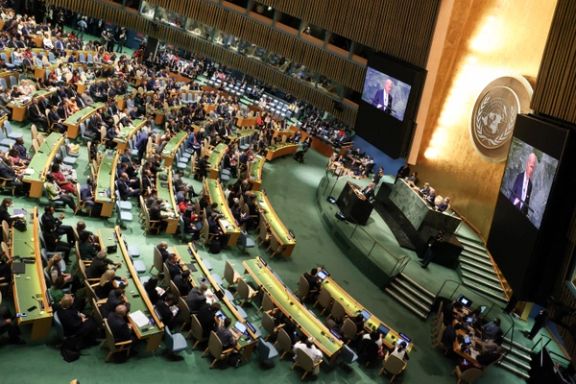UN Week Brings Speeches, Threats But No Progress In Iran Talks

President Ebrahim Raisi has returned home after days of meetings at the United Nations brought no signs of progress in talks over the 2015 nuclear deal.

President Ebrahim Raisi has returned home after days of meetings at the United Nations brought no signs of progress in talks over the 2015 nuclear deal.
Accompanied by Foreign Minister Hossein Amir-Abdollahian and lead negotiator Ali Bagheri Kani, Raisi met in New York with both French President Emmanuel Macron and European Union foreign policy chief Joseph Borrell. Bagheri Kani separately sat down with Enrique Mora, the senior European Union official who has mediated recent exchanges between Iran and the United States.
In public utterances both Iran and US kept up their positions as many analysts continued to rule out any changes before US Congressional elections November 8. Raisi told the United Nations General Assembly Wednesday and a televised press conference Thursday that Tehran expected guarantees over being cushioned from any future US withdrawal from any revival of the JCPOA (Joint Comprehensive Plan of Action). On leaving the agreement in 2018, the US imposed stringent sanctions that sent the Iranian economy into two years of recession and severely restricts its international trade.
Raisi also reiterated Iran’s expectation that for JCPOA restoration the International Atomic Energy Agency (IAEA) should close its current probe into nuclear work carried out by Iran before 2003. Tehran claims the agency revived its interest in 2018 – having produced a ‘final report’ in 2015 – only after Israeli allegations.
According to Raisi’s website, Iran’s president told Macron that Europe should distinguish itself from US policies and resist “pressures” over “technical” issues. IAEA director-general Rafael Mariano Grossi said Wednesday he hoped to speak to Iranian officials within days as Iran needed to resolve issues over uranium traces found by inspectors after 2018 in sites linked to pre-2003 work but not declared as nuclear-related. Grossi reported June his dissatisfaction with Iran’s explanations.

‘Close these probes’
US President Joe Biden told the United Nations General Assembly Wednesday that the US remained open to reviving the JCPOA if Iran “steps up to its obligations.” A US State Department official Thursday told reporters Thursday Tehran was “asking us and European countries to put pressure on the IAEA and its director-general to close these probes, something we will not do.”
The official said the US respected the IAEA’s “independence,” although it was widely reported the US, and Russia, supported Grossi’s appointment in 2019. When US ambassador to the UN, John Bolton, a staunch opponent of Iran nuclear talks and supporter of the opposition Mujahideen-e Khalq, reportedly in 2009 called then IAEA chief Mohammad ElBaradei a “pain in the neck.”
‘Credible military threat’
Also at the UN, Prime Minister Yair Lapid said Thursday said Israel, “a world leader in peace,” would, with the “world taking the easy option,” do “whatever it takes” against Iran. “The only way to prevent Iran from getting a nuclear weapon is to put a credible military threat on the table,” he said. “We have capabilities and we are not afraid to use them. We will do whatever it takes.”
Lapid, who faces a general election November 1, has been sounding tough over Iran to ward off the challenge of opposition leader Benjamin Netanyahu and to win votes from ‘moderate’ voters inclined to Labor, National Unity, and Meretz. With Israel-Palestinian talks moribund since around 2011, Lapid told the UN he favored the creation of a “peaceful Palestinian state that would not threaten Israel,” so appealing not just to ‘moderate’ Israeli voters but to the Biden administration.
As well as electoral considerations, Lapid is keen to make the supply of air-defense systems to the United Arab Emirates more palatable to states, including the UAE, that in reaching ‘normalization’ agreements with Israel thereby ditched the Arab League precondition that this be done only once a Palestinian state was established in the Israeli-occupied territories.
Reuters reported “two sources familiar with the matter” Thursday that the arms deal was done during the summer, around the time Biden visited Saudi Arabia and met Arab Gulf leaders. Rafael-made SPYDER mobile interceptors would put the UAE is a stronger position against any Iranian deterrence over an Israeli attack and would move Israeli radars significantly nearer Iran.